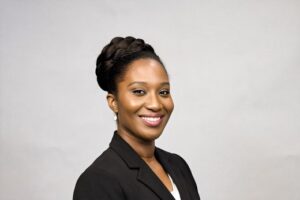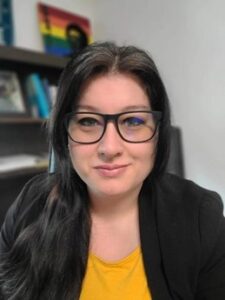2024 – 2025 Fulbright Recipients
Kimberley Folkes-Dunkley
Research Award, Education, Jamaica

Kimberley Folkes-Dunkley is a Community Based Educator and a Joint Doctoral Student in Education at Claremont Graduate University and San Diego State University. She is the recipient of a 2024-25 Fulbright Research Award to Jamaica, where she will use semi-structured interviews and focus groups to explore the educational aspirations and identity development of Jamaican college students. Her research aims to examine the push and pull factors propelling people to seek higher education in the United States and the effects on Jamaica when numerous highly skilled professionals leave the country. This body of work will inform her dissertation studies.
Kimberley, a native of Jamaica, states, “The decision to conduct research in Jamaica is deeply personal. It represents a homecoming and a journey of rediscovery, a chance to honor my familial legacy and heritage, while contributing valuable insights to the academic and local community.” Kimberley hopes her work will illuminate the stories and experiences of her participants to not only advance scholarly knowledge but also benefit the people of Jamaica, fostering a deeper understanding and appreciation of the island’s unique cultural and social dynamics and the beautiful people who call Jamaica home, despite their geographical location in throughout the Diaspora.
Interview
What do you recommend to students wishing to apply for a Fulbright?
Timing is everything! Start early by taking advantage of the support offered through the CGU Fulbright Initiative. They provided valuable insights and information in helping me fully understand the program, the requirements and offered great support along the way. I truly appreciated how they had multiple event offerings stagnated across months, allowing students to chunk the different requirement pieces over time. Research your host institution and as soon as you can, reach out and start to make connections with folks of interest. I also recommend taking advantage of the writing prompts offered through the CGU workshops and visiting the Fulbright website often, where they have tons of information that can aid you in the process. I simply cannot overstate the importance of starting early as you never know what hiccups may occur along the way.
Do you have recommendations for securing a letter of affiliation in the host country?
This is such a critical step in demonstrating the feasibility and support for your proposed research or project. Give yourself sufficient time to be able to receive the letter or two in advance to alleviate any pressure and anxiety. Identify multiple potential affiliates/individuals and make connections by networking. Seek their recommendations about your proposed ideas and undertaking and be flexible and open to suggestions.
What resources on campus should students seek out?
There is no shortage of on-campus resources at CGU. A few I would recommend are The Career & Professional Development office (CPD), the Center for Writing and Rhetoric (CWR), and the Office of Research, Sponsored Programs & Grants. I would also recommend following up with your faculty advisors and mentors for additional support and guidance. Lastly, the support provided by Rebecca Donaldson, the CGU Fulbright Program Assistant and the interview portion provided by the CGU Fulbright committee were extremely helpful. The questions and feedback posed helped me to get very granular on my topic and eased a lot of fears.
What should students be thinking about as they complete their applications?
There are several important things to keep in mind while crafting your application. The key to Fulbright experience is about reflection and reciprocity. How will you convey the importance of your project and its potential impact both during and after your Fulbright experience? How can you use your personal statement to provide context for your academic and professional journey, explaining why you are uniquely qualified for the Fulbright opportunity? How will you foster global cooperation and strengthen intercultural relations? As much as the experience is about your research, teaching or project, it is about humanism and promoting mutual understanding across borders and borders. Envision activities and opportunities that will foster community and reciprocal exchanges. Fulbright is a wonderful opportunity to engage and create activities for others. Get creative and do not be afraid to step outside of your comfort zone.
Charlene Holkenbrink-Monk
Postdoctoral Studies, Education, Spain

Charlene Holkenbrink-Monk received her PhD in Education in 2023 from the joint doctoral program at Claremont Graduate University and San Diego State University. She is a 2024-25 recipient of a Fulbright Scholars Award to Spain, which will take place at the University of Malaga in the Department of Didactics. Her work will explore how students can develop and practice their English skills using participatory visual research and sociological thinking. Participatory visual research entails anything that is participatory and visual in nature. Using photography, she will investigate how students can develop their English skills by discussing important social issues centering their cultural backgrounds and taking photos that represent them.
Interview
What advice do you have for students who have recently received their PhDs and are wishing to apply for a Fulbright Scholars Award?
My first piece of advice is to go for it. Often when we finish our PhDs, we are thinking about faculty positions. A beautiful part of the postdoc with Fulbright is that I have the opportunity to focus only on my research, which will support my future career. It also provides me with the chance to network.
What are you looking forward to most about doing a Fulbright?
On a personal level, the ability to finally go abroad—to do my research there. I’m also really excited to learn things outside my silo of California and bring it back to my students.
What is your advice for students wishing to apply for a Fulbright postdoc?
It depends where they are at in their educational journey. You should go to conferences from the very beginning. Reach out to people who have had these experiences to make connections prior to applying. Ask your professors. Ask your advisors. Network as much as you can. I also recommended giving yourself sufficient time to complete the application—at least 4-6 months.
Do you have any recommendations for securing a letter of invitation?
Securing a letter of invitation early on is important. It is the most time-sensitive in the application process because you’re relying on somebody else to write this and you need to submit it. Remember that there are sometimes cultural differences in terms of time and leisure, too. Give yourself ample time to work on your application, and work on securing a letter of invitation early on.
What do you recommend for people who are just getting started with a Fulbright Scholars application?
- Do it.
- Seek out the services available to you.
- Create your own personal timeline.
- Don’t rush it.
- Believe in yourself. Imposter syndrome might creep up. Be open to criticism, but be firm enough in what you know.
- Don’t underestimate your dissertation and what it can do for your application.